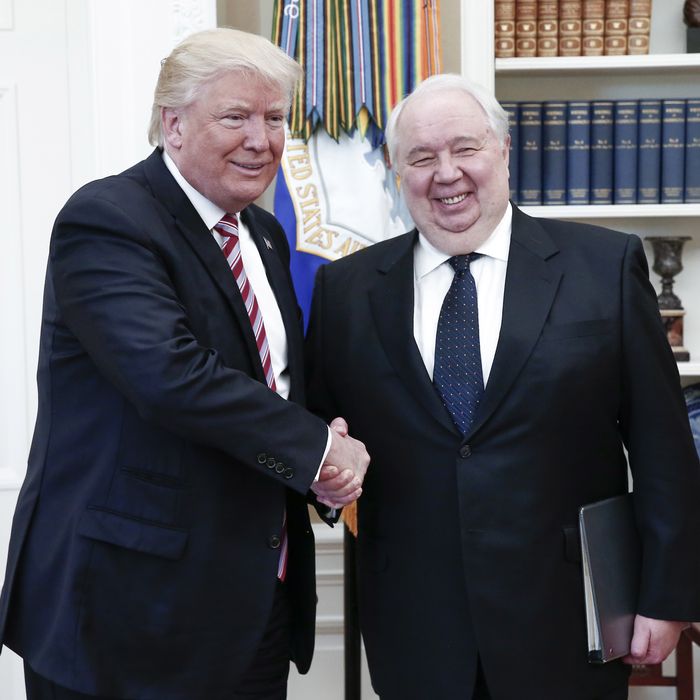
Trump with Russian ambassador Sergey Kislyak. Photo: Alexander Shcherbak/TASS via Getty Images
New Transcript Shows Trump Adviser Michael Flynn Colluding With Russia in 2016
Michael Flynn, the former Trump national security adviser, pleaded guilty in federal court to the charge of lying to FBI officials about a conversation he had with the Russian ambassador. Flynn’s defenders have insisted his lie was innocent and immaterial.
Late Friday afternoon, the Trump administration released the transcript of that conversation. The timing itself does not indicate much confidence that the transcript would support Flynn’s interpretation (late Friday afternoons not being the customary time to drop favorable news stories). And indeed, the transcript makes Flynn’s call look even less innocent.
On December 29, 2016, President Obama announced economic sanctions against Russia to retaliate for its interference in the presidential elections. Flynn, Trump’s incoming national security adviser, quickly got on the phone with Russian ambassador Sergey Kislyak. When word of the phone call leaked, the administration announced that the call had merely served the purpose of touching base and exchanging pleasantries. “On Christmas Day, General Flynn reached out to the ambassador, sent him a text, and it said, you know, I want to wish you Merry Christmas and a Happy New Year, I look forward to touching base with you and working with you,” announced Press Secretary Sean Spicer. “The call centered around the logistics of setting up a call with the president of Russia and the president-elect after he was sworn in.”
The FBI, which was already conducting a counterintelligence investigation into the Trump campaign’s ties to Russia, asked Flynn if he and Kislyak had discussed the sanctions. Flynn insisted he hadn’t, a lie he later pleaded guilty to.
Flynn’s lawyers insisted his call was “consistent with him advocating for, not against, the interests of the United States.” That depends heavily on how one defines “the interests of the United States.” In December 2016, the United States had a strong interest in punishing and deterring hostile foreign governments that had stolen the private communications of American political figures in order to affect the outcome of the election. By January 20, the United States would have a very different interest.
That context looms over the Flynn-Kislyak call. The U.S. government at the time was treating Russia’s efforts to help Trump win as a hostile act. The beneficiary of those acts was not.
A recent lengthy polemic supporting Flynn by conservative reporter Eli Lake presented this defense of the call:
The idea that Flynn had behaved illegally, let alone unethically or immorally or unconventionally, in discussing U.S. foreign policy with the Russians during the transition is beyond absurd. He was the incoming national-security adviser. Phone calls between incoming senior administration officials and foreign governments are common during a presidential transition. And given what is now known about the context of that phone call, the initial spin in the press that Flynn’s conversation with Kislyak had undermined the outgoing administration’s policy was misleading.
The transcripts today quote Flynn telling Kislyak, “Do not, do not uh, allow this (Obama) administration to box us in, right now, okay?” If that does not constitute “undermined the outgoing administration’s policy,” what does?
Two days later, the two men held a follow-up call, in which Kislyak made the premise more explicit. “I just wanted to tell you that we found that these actions have targeted not only against Russia, but also against the president elect.” Flynn replied, “Yeah, yeah,” accepting the premise. Kislyak then said he agreed with Flynn’s request not to retaliate. “We have decided not to act now because, it’s because people [presumably the outgoing Obama administration] are dissatisfied with the loss of elections, and it’s very deplorable.”
Flynn’s discussions with Kislyak were not part of a criminal conspiracy. They were, however, part of a secret channel of communications, the premise of which was that the two parties had a secret common interest against the United States government. One word that might describe this relationship would be “collusion.”
No comments:
Post a Comment